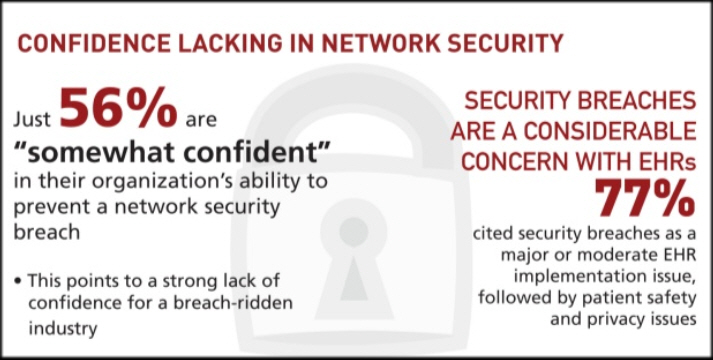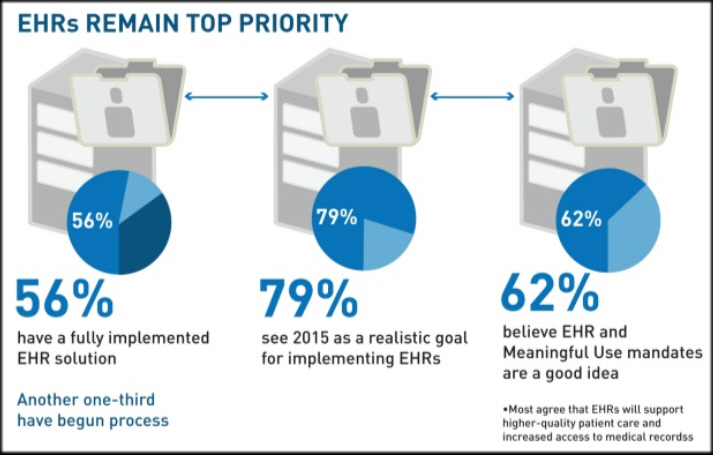A new research report just released by telecommunications heavyweight Level 3 points to major challenges for healthcare tech this year. One interesting result of the study is that the report finds healthcare IT not as concerned about mobility (mHealth) as we might prefer to believe they are. Another is that they lack urgency in terms of implementing cloud computing capabilities.
Level 3 Communications, which was founded in 1985 and launched an IPO in 1998, has had a very successful run to date. That run includes growing into a communications industry consolidator as it acquired a range of companies between 2005 and 2007.
Most recently, in the fall of 2011 Level 3 and Global Crossing joined forces (keeping the Name Level 3), allowing the company to now deliver an integrated network delivering a deep U.S. and European footprint as well as an extensive international intercity network. Level 3 now delivers more than 450 core network markets in North America, EMEA, Latin America and Asia, as well as a total of roughly 100,000 route miles.
With that pedigree Level 3 clearly has a strong interest in many IT areas, with one of the more important being the healthcare industry. Along those lines the company has now released the very interesting healthcare IT study we noted above - a report that sheds some very interesting light on a number of healthcare tech-related issues.
For the study titled, “Future of Healthcare IT,” Level 3 commissioned Corona Insights to drive the research for it, which took place in November 2012. Corona pulled together a panel of 100 CIOs and other c-level and senior IT executives who are employed by hospitals, medical centers and physicians offices. The size of the organizations managed by these CIOs and executives range in revenue from $10 million to $1 billion and provides a wide range of viewpoints. As well, all graphics provided in this article are courtesy of Corona Insights.
Top of Mind Healthcare IT Issues
Network security issues, vital infrastructure upgrades, Electronic Health Record (EHR) implementation and imminent federal deadlines will guide priorities this year according to the study. At the same time as we noted earlier, mHealth and cloud computing are not nearly as important according to survey responses.
- Research highlights and IT challenges for 2013 include the following:
- 56 percent of respondents were only “somewhat confident” in their ability to prevent a privacy or security breach on their network
- 76 percent of respondents are planning to upgrade their network infrastructure in the next two years
- 24 percent reported they are using cloud-based computing, much lower than other industries
- Only 17 percent believe mHealth will have a significant impact on the healthcare industry
- 80 percent agree that EHR-based systems will improve patient care
- More than 60 percent of respondents suggest EHR and Meaningful Use mandates are a “good idea” to support better quality patient care
Security Confidence Lacking
The issue of security is huge for the healthcare industry, and if we were the betting type we'd bet that IT execs were probably fairly confident that they have security under control. It's a good thing we aren't the betting type, as the graphic below shows.

The research study found that many healthcare organizations might not be prepared to deal with the scale of the security challenges headed their way, as more and more critical patient information is digitized.
Though 80 percent of respondents reported that their organization had not experienced a security breach in the past 12 months, as the chart above shows, 56 percent of those respondents were only somewhat confident in their ability to prevent a security breach on their network.
This indicates a strong lack of confidence for an industry that experiences a significant number of security breaches each year. In fact, it is worth noting that a 2012 survey of 80 healthcare organizations from the Ponemon Institute found that 94 percent of the organizations in that study had at least one data breach in the past two years, at an average cost of $2.4 million per data breach. No small wonder then that in the current survey 77 percent of respondents view security breaches as a significant concern and a critical issue for EHR implementations.
The next chart shown below makes it clear that HER remains the top priority for healthcare IT. Security breaches and patients’ privacy issues were slightly more likely to be of “major concern” among large organizations, due to the sheer volume of patient information at risk. Lower on the list of EHR implementation concerns was penalty costs – 35 percent said security and compliance-related penalties were of little to no concern.

Karl Strohmeyer, Level 3 group vice president, underscores that, “Patient privacy and the security of electronic health records are weighing on the minds of healthcare CIOs. The ‘Future of Healthcare IT’ study reinforces that there is no room to take chances when patients’ privacy is at risk – ensuring the confidentiality of patient data should be a top priority. As more and more healthcare-related information is digitized and shared remotely, the need for secure networks and services to protect this data will continue to grow.”
Overall key priorities for healthcare IT are shown below.
.jpg)
Electronic Health Records - A Good Idea
The Level 3 study, as the graphic below makes clear, also reveals that although most healthcare organizations are under a good bit of pressure to implement and deliver EHRs - which is necessary to meet new federal regulations under the Patient Protection and Affordable Care Act (ACA) - the flip side of it is that most healthcare CIOs and senior executives support the efforts.

They further believe that ACA timeframes are feasible. More than 60 percent of respondents suggest EHR and Meaningful Use mandates are a good idea. This is due primarily to the fact that EHRs are expected to effectively increase the quality of and speed up access to medical records and information by healthcare providers, which in turn will help to deliver much better quality patient care. In addition, and regardless of pressure to implement, 79 percent of respondents believe the 2015 EHR deadline is feasible.
Slow Adoption of Cloud Computing, Little Traction for Mobility
Although we might have anticipated a better state for security than the survey reveals to be the case, there aren't really any surprises in any of the above. However, we are very surprised to learn that there essentially no hurry on the part of healthcare IT to deliver mobile solutions, as the graphic below indicates. The lack of appetite for cloud solutions is also surprising albeit more understandable given the lack of IT confidence in security that was detailed earlier.
Many respondents recognize that cloud computing can offer cost savings and capacity benefits, yet only 24 percent reported they have cloud-based capabilities in place, a very low uptake compared to other industries. Again, we strongly suspect security and privacy issues - compounded as well by HIPPA and numerous federal, state and local regulations - are the underlying reasons here.
For us, that only 17 percent of respondents believe mobile-enabled healthcare will have a significant impact on the healthcare industry remains a mystery. The conclusion here is that the healthcare IT industry may not yet be fully primed for a widespread move to mobility, but that certainly isn't the impression one gets from what we perceive to be a highly energetic mobile market within healthcare.
On the other hand, the survey results also show that telehealth is a growing trend, with 67 percent of those surveyed indicating that they currently have telehealth capabilities. The driving factor behind telehealth is patient care. Respondents believe these capabilities will offer both providers and patients better access to EHRs and, as a result, improve patient care. We wonder if respondents are confusing the term "telehealth" with mobile health. We don't have the space to share our thoughts here, but it's worth keeping in mind.
Infrastructure Upgrades Always in the Works
Finally, 37 percent of respondents believe interconnectivity of healthcare facilities will have the greatest impact on the healthcare industry, and another 27 percent believes EHRs themselves will have the greatest impact. The study clearly shows that network infrastructure demands will continue to grow as healthcare organizations try to prepare for increased interconnectivity of healthcare facilities, security demands and other healthcare-related technology advancements.
More than three-quarters (76 percent) of respondents are planning to upgrade their network infrastructure in the next two years driven by implementation of EHRs, interconnectivity between providers and facilities, and medical imaging demands. The graphic above provides an overview.
Strohmeyer adds, "The expansion of network infrastructure that we anticipate will allow healthcare organizations to store massive amounts of patient information securely. Providers can access digitized information from any location in real time, ultimately resulting in substantial efficiencies in patient care. Interconnectivity and network security are essential to meeting the growing demands of the digital healthcare world."
We're certain Level 3 is ready to help deliver on all of it.
Edited by
Jamie Epstein